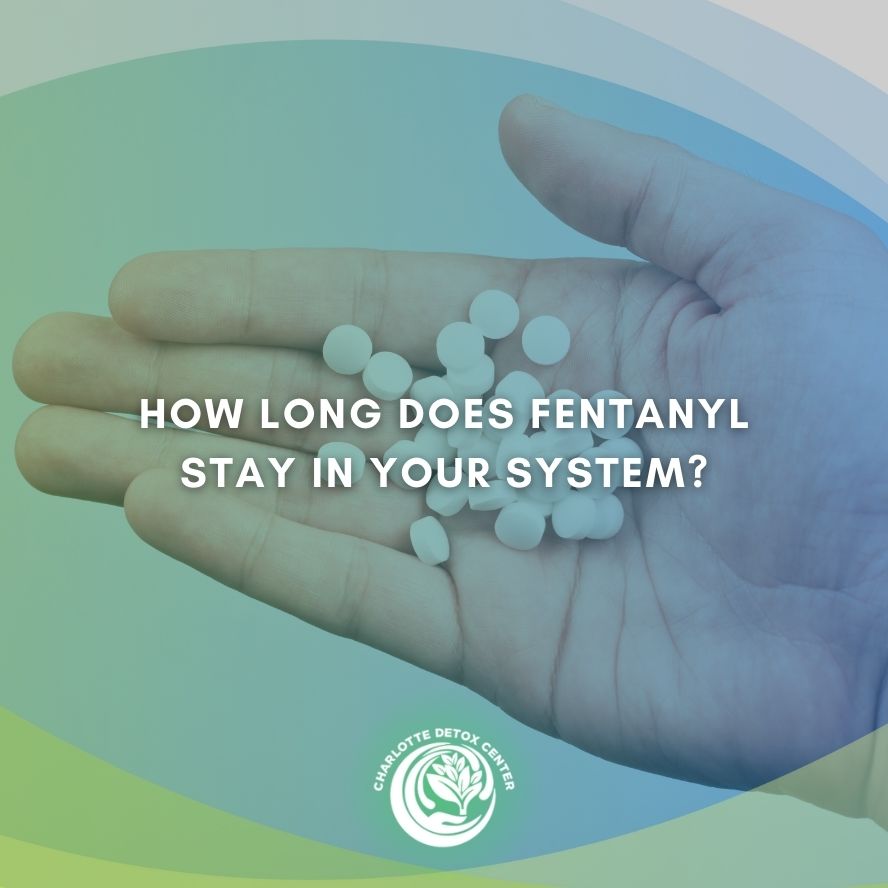Fentanyl is a potent synthetic opioid that is prescribed to treat severe and chronic pain. Legal versions of fentanyl are only prescribed by doctors and are dosed in amounts that are safe to consume. Unfortunately, there is a version of fentanyl that is manufactured illegally and is highly dangerous.
Also known as illegally manufactured fentanyl (IMF), this substance has led to high rates of addiction and staggering amounts of fatal overdoses. According to the CDC, 70% of the 109,000 overdose deaths in 2022 were related to IMF.[1]
If you or a loved one abuse fentanyl, you might be wondering how long it stays in your system. Knowing this information could prevent you from taking too much fentanyl at once and experiencing a life-threatening overdose.
Typically, fentanyl leaves your system within 22 to 36 hours depending on what method of administration you are using. Drug tests can detect it in your body longer, especially if you have been using fentanyl long-term.
What you will learn:
- How long the effects of fentanyl last
- How long fentanyl stays in your body
- Which factors play a role in how long fentanyl stays in your system
- Whether fentanyl shows up on a drug test
- How long you will test positive for fentanyl after using it
How Long Do the Effects of Fentanyl Last?
Fentanyl is intended to treat pain, but it can also lead to a drowsy and euphoric high. If you are abusing fentanyl, you are probably doing so to experience relaxation, euphoria, and other mind-altering effects. You might be using fentanyl to avoid withdrawal symptoms if you are already addicted to it.
The side effects of fentanyl may include:[2]
- Pain relief
- Dizziness and drowsiness
- Euphoria and calmness
- Sedation
- Confusion
- Nausea and vomiting
- Pinpointed pupils
- Slowed breathing and heart rate
How long fentanyl lasts depends on how you are using it. If you are injecting fentanyl intravenously, it will last between 20 to 60 minutes. Intramuscular injection lasts 1 to 2 hours, while fentanyl patches slowly release the substance for up to 3 days.[3]
If you are addicted to fentanyl, withdrawal symptoms will show up between 24 to 72 hours after your last dose. Since opioid withdrawal can be incredibly uncomfortable, you should always seek help from a medical detox center.
How Long Does Fentanyl Remain in Your Body?
To understand how long fentanyl stays in your system, you need to know what a drug’s half-life is. The half-life explains how long half of a substance stays in your system. It typically takes 4 to 5 half-lives for your body to completely eliminate a drug.
The half-life of fentanyl depends on the method of administration you are using. When you inject fentanyl into your veins, the half-life is between 2 to 4 hours.[4] It can take between 11 to 22 hours to leave your system.
Fentanyl patches or lozenges have a half-life of 7 to 17 hours, which means it can take 36 hours for it to completely leave your system.[4]
It is important to note that there is no way to flush fentanyl out of your system faster. If you are trying to pass a drug test, the only way to ensure a negative result is to abstain from substance abuse.
Factors that Influence How Long Fentanyl Stays in Your System
The length of time that fentanyl stays in your body depends on a variety of factors. For example, if you’ve been abusing fentanyl consistently for a few months, it will remain in your body longer than a first-time user.
Other factors that affect how long fentanyl remains in your body include:
- Method of administration, like smoking or injecting
- How long and how often you are consuming it
- The dose of fentanyl you take
- Age, weight, and rate of metabolism
- Body fat percentage
- Biological sex
- The health of your liver and kidneys
- Whether you have consumed other substances
No matter how you are abusing fentanyl, you could experience a life-threatening overdose. Due to this, you must seek fentanyl addiction treatment to achieve long-term sobriety. Healthcare professionals will help you recover from fentanyl misuse with a combination of detox, behavioral therapies, and relapse prevention planning.
Does Fentanyl Show Up on a Drug Test?
If you abuse fentanyl, you are probably wondering how long it shows up on drug tests. The amount of time that you will test positive depends on what type of drug test is being used. For example, hair tests usually have a longer window of fentanyl detection than blood tests.
Urine
Urine tests are the most commonly used type of drug screen. These tests can detect fentanyl in urine for 24 to 72 hours after your last dose.[5]
Blood
While they are not used as commonly as urine tests, doctors might use blood tests to determine what drugs are in your system. Blood tests can find fentanyl in your bloodstream for up to 48 hours after you last used it.
Saliva
Saliva tests are considered less reliable than other types of drug screenings, especially when it comes to fentanyl. Because they cannot consistently detect the substance, they are not used to determine if you have consumed fentanyl.
Hair
Lastly, hair tests are seldom used because studies have found that they offer unreliable test results due to hair color discrimination.[6] Hair follicle drug tests can detect any substance in your system for up to 90 days after you last used it.
Find Help for Fentanyl Abuse and Addiction
If you or a loved one abuse fentanyl, it’s time to seek professional help. Consistent use of fentanyl increases the risk of experiencing a life-threatening overdose. Thankfully, medical detox programs like Charlotte Detox Center can help you begin your recovery journey on the right foot.
At Charlotte Detox Center, we use FDA-approved medications to treat withdrawal symptoms. This means you will remain both safe and comfortable during the withdrawal process, increasing your chances of long-term sobriety. We also provide 24/7 access to mental health professionals, ensuring you receive support when you need it the most.
Contact us today for more information on how we can help you recover from fentanyl addiction and regain control over your life.
References:
- The Centers for Disease Control and Prevention (CDC): Routes of Drug Use Among Drug Overdose Deaths — United States, 2020–2022
- The Drug Enforcement Administration (DEA): Fentanyl
- The Food and Drug Administration (FDA): Fentanyl Citrate Injection Label
- The National Library of Medicine (NLM): Fentanyl
- The University of Texas at Dallas: Researchers Develop Rapid Test for Detecting Fentanyl
- American Civil Liberties Union (ACLU): Hair Tests: Unreliable and Discriminatory








